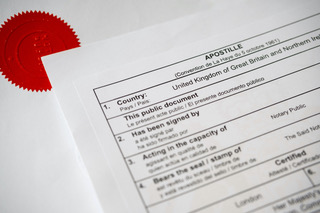A quick word about apostilles and certification
If you prefer, the certification stamp of the generally sworn translator, which attests to the translation being true to the original, can be added to your documents and certificates. Within the Federal Republic of Germany, this stamp will generally meet your needs, because all sworn translators have taken an oath before the relevant court – Hanover Regional Court in the case of Lower Saxony – and have provided a specimen signature.
If you wish to submit your translated documents to a German authority, they must be stamped in this way. Incidentally, there is no difference between the German terms ‘vereidigt’, ‘beeidigt’ and ‘ermächtigt’; these are merely regional variations depending on the federal state in which the translator took their oath.
However, if you need to submit your translation abroad, then the rules vary widely from one country to another. An apostille, also known as a Hague apostille, will often be required in addition. An apostille is a form of verification used for the international certification of documents and attests to the authenticity of the document, stamp and/or signature. You should enquire of the authority to which the translation is to be submitted whether an apostille is required, possibly at your home country’s Embassy. This might spare you unnecessary expense and inconvenience. An apostille is issued either by a court or by a police department. Courts issue apostilles for notarised documents, and police departments for documents issued by official bodies. You should make your own enquiries to the relevant authority about the cost of an apostille. If the body for which you require the translation requests an apostille, you should ideally obtain this before commissioning the translation from us, because the apostille will then also have to be translated.
Example: Your child was born in Germany and issued with a German birth certificate which you have to submit in the country where you have citizenship. An apostille is often required in such circumstances. You must obtain this before having the document translated.
To clarify: ‘certification’ (i.e. the certification stamp of the translator) attests to the fact that the translation of your document is true to the original; an apostille, on the other hand, verifies to the authorities of another country that your documents are authentic.
